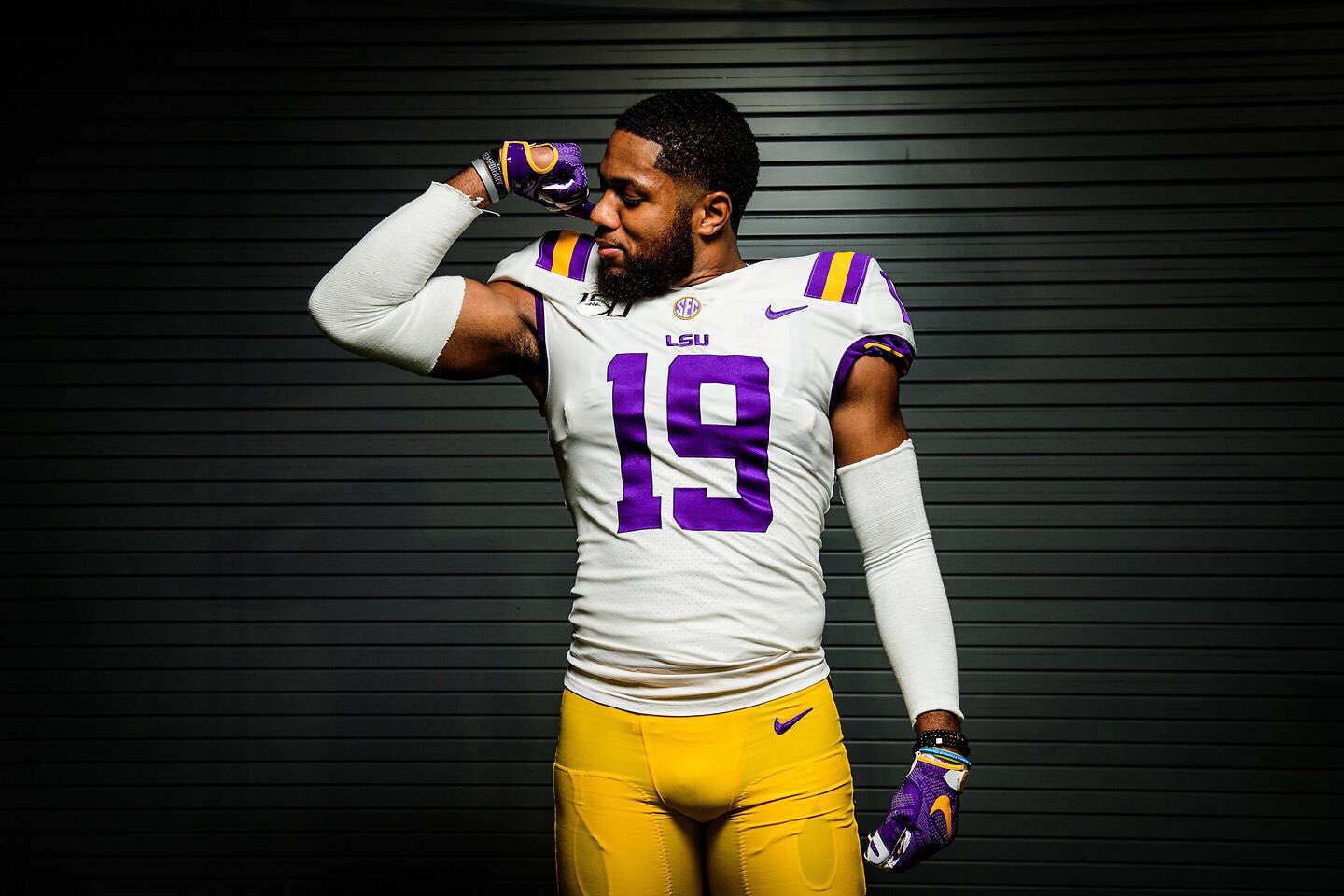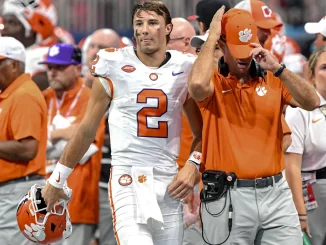
Jabril Cox’s competitive fire as a first-team All-American linebacker for North Dakota State’s three consecutive Division 1-AA (FCS) national championship teams isn’t difficult to understand.
Especially when you learn the simple parental advice Cox received many years ago.
“My dad always instilled in me to play 10 times better than your competition,” Cox said.
That approach paid off, especially when the 6-3, 230-pound Cox decided after last year he wanted to play his final college season as a graduate transfer on the Division 1-A (FBS) level.
So, knowing he’d graduate in May, he placed his name in the NCAA transfer portal on March 3 with modest hopes.
“I was really looking at some lower Power 5 (Conference) schools,” said Cox, who committed to the Tigers on April 2. “I didn’t even expect LSU to come calling after winning a national championship. But when they did, it was an opportunity I couldn’t pass up.”
The reason LSU eagerly tossed its helmet in the ring for the services of Cox, who will start in Saturday’s season opener vs. Mississippi State, is the Tigers knew exactly what they were getting.
New LSU defensive coordinator Bo Pelini didn’t need to watch much film of Cox. Pelini came to LSU from Youngstown State where he was a head coach who lost three times to Cox and the Bison.
Cox had a combined 23 tackles and four tackles for losses in wins of 27-24 in overtime in 2017, 17-7 in 2018 and 56-17 last year.
Pelini grew tired of seeing Cox destroying his Youngstown offenses.
“I think he’s been here (at NDSU) since I was in grade school,” Pelini lamented after last year’s loss. “Sometimes I don’t know what the NFL guys look for, but how you don’t watch this kid on film and say that you don’t want this kid on your football team. . .you don’t know much about football if anybody says that. He’s a good football player. He’s an NFL guy. He is really good.”
Well, if you can’t beat them, change jobs and recruit them, which is why Pelini was eager to bring Cox to Baton Rouge
On NDSU teams that won 57 of 60 games , Cox had 258 career tackles with 32 for losses including 14 sacks, as well as 18 quarterback hurries, 12 pass breakups and six interceptions.
“He was an outstanding player at North Dakota State,” said LSU head coach Ed Orgeron of Cox. “They have a tremendous culture there. Those guys win year in and year out. He’s a great character young man. He came highly recommended.”
It hasn’t always been this way for Cox. Five years ago, he was barely a recruiting radar blip, and it wasn’t because of a lack of talent.
He was a four-year starter in football, basketball and baseball at Kansas City (Mo.) Raytown South High and seemed destined for a major college football scholarship. He played quarterback, wide receiver, linebacker, safety and cornerback.
Cox was moved from receiver as a sophomore to quarterback as a junior. He got off to a fast start, throwing for 1,300 yards and 13 TD. Just when college recruiters took notice, Cox sustained a season-ending torn ACL.
He was down, but not out. He grinded away at rehab, determined to return better than ever as a senior.
And he did. He put up 3,107 yards total offense (2,103 passing, 1,004 rushing) and accounted for 31 touchdowns (18 passing, 13 rushing).
But the recruiters didn’t return. Cox was rated a 2-star recruit who was grateful to sign with FCS powerhouse North Dakota State nine hours from Kansas City in Fargo.
The North Dakota State coaches were thrilled, convinced they got a recruiting steal.
Yet not too long after he enrolled, the coaches wanted him to redshirt and move to linebacker.
“My whole little league and through high school I played quarterback,” Cox said. “I’d played defense, also, but transitioning to linebacker at NDSU was something I didn’t look forward to. I had to adapt because I was always used to having the ball in my hands. Just trying to find ways to create turnovers to get the ball in my hands is something I took as a challenge.”
Cox spent his first year soaking up knowledge in the linebackers meeting room, particularly from a couple of veterans.
“Chris Board who now plays in the NFL with the Baltimore Ravens and Nick Deluca (who has also played in the NFL) helped me out a whole lot,” Cox said. “They took me under their wings and showed me the ropes of how to be a college football player.”
After his redshirt season, Cox opened his college career in 2016 as Board’s backup. When Board got hurt during the season’s sixth game against Pelini’s No. 8 nationally ranked Youngstown State team, Cox entered the game and had a sack on his first play.
He finished with eight tackles including two sacks.
It was the start of Cox’s brilliant, honor-filled career playing for the most unbeatable team in the FCS. But after getting a third national title ring last season, he wanted more.
He probably could have entered the NFL Draft and would have gotten picked. But he knew he would be fighting a stigma attached to FCS players.
“It doesn’t matter how good you are, they talk about the level of (FCS) competition,” Cox said. “I wanted to take that knock off me. Having won three national championships at the FCS level, I wanted to challenge myself. Entering the portal trying to better myself was the next move for me.”
More than 40 schools contacted Cox. It took him a month to decide just as the NCAA shut down all sports because of the coronavirus pandemic. But LSU emerged the winner for several reasons.
The biggest was Tigers’ assistant coach Bill Busch. Once LSU discovered Cox’s mother Lotu is American Samoan, Busch took charge of Cox’s recruiting because he had vast experience recruiting Samoan players. He studied the Samoan culture and had flown to American Samoa many times to recruit during his coaching career.
Since the NCAA wouldn’t allow coaches on the road or recruiting visits from prospects because of COVID-19, Busch had to woo Cox without personal visits.
“Having him know about the Samoan culture and having a connection between me and my Mom really helped,” Cox said. “During the recruiting, he texted me every day about getting better and working out. He really kept my mind on track through the whole process.”
Cox felt the Tigers’ program checked the boxes that were most important to him – team culture and family.
“When I was doing my research on LSU, I saw being an LSU football player comes with a lot of pride,” Cox said. “It was the same way at NDSU. Players take a lot of pride in putting on NDSU and LSU uniforms. Then, the work ethic from all guys on both squads is unmatched. And both places have a family atmosphere.”
Finally, Cox was aware of LSU’s NFL pipeline of linebackers in recent years, which sealed the deal.
He has adapted smoothly to the smothering south Louisiana summer humidity as well as training in the state-of-the-art LSU football operations center.
“You can really see the amount of time and effort people put into planning the facility to make it the best for the players,” Cox said. “The technology in the weight room and the nutrition we have at LSU is far more advanced than I’ve ever experienced.”
Cox’s on-the-field transition has been as expected. He’s not intimidated stepping into the FBS level. He played in a 4-3 defense at NDSU, the same scheme Pelini favors.
“If you can play, you can play,” Cox said of fitting into college football’s highest division. “I’ve had to prove myself my entire life.”
Orgeron liked Cox’s NDSU game film – “He was a big linebacker that could run, hit, key and diagnose,” he said – but loves him even more in person.
“I didn’t know he was going to be this good,” Orgeron said. “He’s focused, razor-sharp. He’s smart, always studying and knows the defense. Very fast. He’s a complete linebacker.”




Be the first to comment